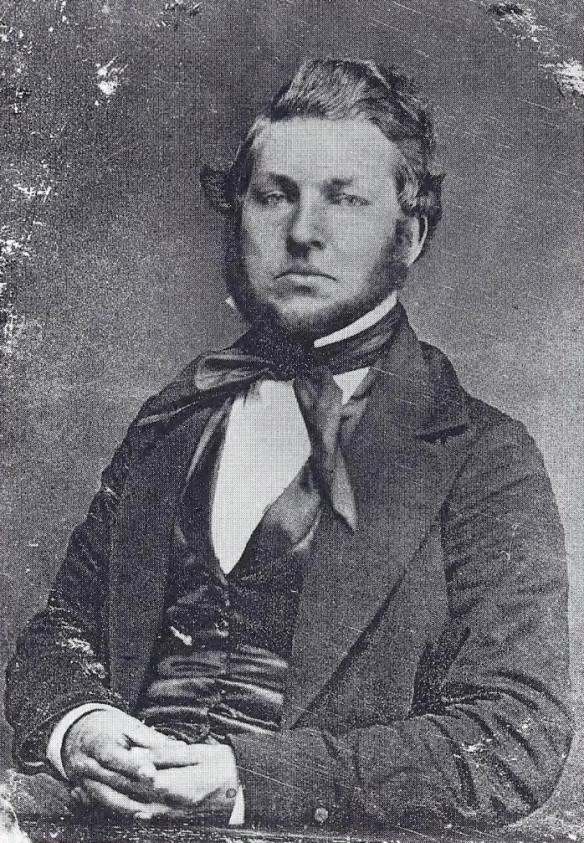Last updated: January 12, 2024
Article
Garfield Telegraph Jan.-Feb. 2024

NPS
The Lost Art of Letter Writing
James A. Garfield was a man of letters. He wrote thousands of letters during his nearly fifty years in this world – to his mother, his wife, his children, aunts, uncles, and cousins. He wrote to other teachers, military men, politicians, and newspaper correspondents. And he wrote to his
friends.
Among his friends was a former student, Burke Hinsdale. Their correspondence began in 1857. It ended with Garfield’s tragic death in 1881. Every year, the two men wrote a letter to the other on or shortly after the New Year began.
Space will not allow the reproduction of entire letters here. What can be illustrated in the space allotted is an illustration of the art of writing a letter, an art involving the skillful use of language to describe an experience, to evoke a scene in the mind’s eye, to express the fullness of the mind and the heart.
In the following brief excerpts, taken from the Garfield-Hinsdale Letters, edited and published by Burke Hinsdale’s daughter Mary in 1949, the beauty of the English language is made evident.
Brother Garfield
… I am very pleasantly located for the winter; good schoolhouse and good school. I have in all about seventy scholars… They can be divided into two classes; first the children of the farmers…secondly the progeny of the miners…I cannot, however, complain of having willful or ugly pupils…
Hiram, January 15, 1857
My Dear Bro. Burke,
I was made very glad a few days since by the receipt of your letter. It was a very acceptable New Year’s present, and I take great pleasure in responding to it. …I am glad to hear of your success in teaching, but I approach with much more interest the consideration of the question you have proposed. …You will agree with me that everyone must decide and direct his own course in life – and the only service friends can
afford is to give us the data from which we must draw our own conclusions and decide our course. …
Twelve years later, with many letters, including those dated at the beginning of a New Year, having been written, came this letter from James Garfield to his friend Burke.
Washington, January 11, 1869
My Dear Burke:
When Congress adjourned for the Holidays, I was taken sick, and kept my bed for nearly a week – and just before New Year’s, being a little better but not yet fit for work, Crete and I went to New York and remained until the 5th. On New Year’s Day I went with Gen. McDowell and visited the Military Academy. This lengthy statement explains why I passed over the day of writing you the usual letter. Having passed the time, I concluded to wait for your letter, and write in response. I hope we shall not allow ourselves to get into the habit of omitting or postponing these New Year’s letters – for they not only keep us advised of the progress, fortune, or misfortune of each other, but they link us to our past selves – and help us measure our own tendencies, better than we can do in almost any other way. …
The following January 1, Hinsdale was the first to write:
Hiram, January 1, 1870
Dear Gen’l:
This day has been a busy one, spent in the classroom and in conversation with some callers…and now, though the children have long been asleep, though Mary too has gone to rest, though the hour is near midnight, though the water formed by the melting snow splashes under the window, my mind refuses to flow into the New Year’s channel. Even at this late hour – or minute – of the day it requires some argument to convince me that this has been January 1, 1870, and yet it was thirteen years ago today that I wrote you my first letter…
Monthly Events
January 10 at noon: Leaders & Legacies of the Civil War Era:
“Stand Fast to the Union & the Old Flag: Re-electing Lincoln in 1864.” Learn about the election of 1864, which was held during the Civil War. President Abraham Lincoln hoped to win a second term, but Democratic candidate George B. McClellan wouldn’t make it easy.
February 14 at noon: Leaders & Legacies of the Civil War Era: “The Life of Ulysses S. Grant.” U.S. Grant was the Union’s most famous Civil War military hero before winning election to the presidency in 1868. Learn more about his life, career and legacy.
Call the Mentor Public Library at (440) 255-8811 for reservations.
February 19 from 11 am to 3 pm: Celebrate Presidents Day with us. We’ll be open 11 a.m.-3 p.m. for tours of the Garfield home, presidential trivia, kids’ activities, crafts and more. We might even get a visit from a president or two. Everything is free of charge, so come out, learn and enjoy at the home of Mentor, Ohio’s favorite son: 20th President of the United States James A. Garfield. Sponsored by the James A. Garfield Alliance and The Garfield Trail of Ohio.
March 13 at noon: Leaders & Legacies of the Civil War Era Series: “Female Spies of the Confederacy.” March is Women’s History Month, so come hear fascinating tales of Southern women who spied for the Confederacy during the Civil War: how they gathered intelligence, how they got it into the hands of Southern leaders and what happened to them.
Call the Mentor Public Library at (440) 255-8811 for reservations.
